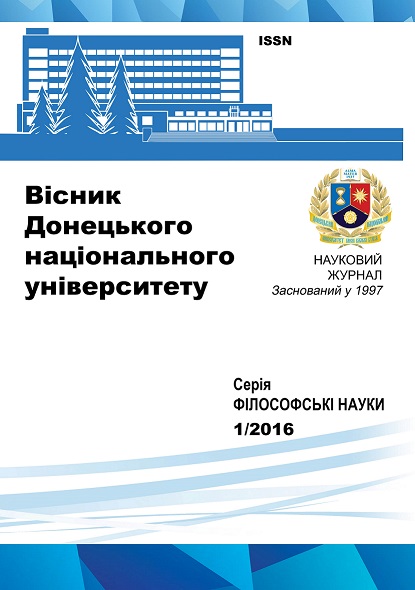Topological Measuring of Sacralisation.
Keywords:
sacral, sanctity, profane, symbol, ritual, sacralisationAbstract
In the article basic lines of sacral and profane was certain. The aim of this article is an analysis of process of forming of sacral space and pre-conditions of transformation available in sacral. Maintenance of concept «sacral» is determined. The semantic mode allows to set next senses of sacral: divine, good, positive, light; dangerous, closed, hidden, secret, separate; oblatory, strong, power, law, order, ancient, initial; rich. His interrelation with concepts «sanctity», «religious», «supernatural» is examined. Profane is interpreted as mundane, confined holiness, workaday, accessible, settled, individually-empiric and in such context matched against sacral. Relativity and sociocultural hidden motive of the sacral phenomena are well-proven. It is proved that the semantics of the sacred is not confined to traditional religious aspect. The sacral is presented as ontological primary reality, first-potency of cultures. Properties of good organization, structured of the world, inviolability, exceptional nature, power and efficiency are added sacral. To realize world structured, it is needed to define his center. «Our», the «veritable» world always is in a center. Symbolism of «center» recurs not only in cosmological but also in sociocultural or political context, coordinates mutual relations between «home» and by other worlds. The analysis of logic of sacral interpretation of the world is given. Equality of rights of different pictures of the world, research programs, linguistic frameworks and language games gives an opportunity to be set by a question about legitimacy of «other» logics, that differs from the classic formal logic. Marked features of sacral logic: complication of transition from part to general, groundless equation only and plural, explanation unknown through unknown, mixing of temporal modalities, exception from causal connections of chance, indifference to contradiction, id est combination of oppositions is in one presentation. Sacralisation is shown as a process of erection in status of sacred certain object, place or man. Dividing of all objects into two opposite classes – secular and sacred – we consider the main feature of analysis of the sacralisation and basis for determination of priority toposes of this process. Sacralisation is the effective method of social management. Тhe role of myths, symbolization and rituals shown in the process of sacralization. Political sacralisation is considered as a desire of the power to fasten the status, instrument of the manipulations on the masses for the achievement of certain political aims. Sacralisation of power gives to her description, that convinces the people of reality, skilledness, effectiveness and inviolability of such power. The release of politics from sacralness testifies to forming of open society, that does not need specific sacral ways for intermingling with the vertical line of power, but creates the clear democratic mechanisms of political stratification.References
Луговский Г. В. О природе сакрального. К истокам духовного опыта / Г. В. Луговский. [Электронный ресурс]. Режим доступа: http://rutlib.com/book/6456
Сакральное / Под редакцией В. С. Стёпина // Новая философская энциклопедия: В 4 т. /. – М.: Мысль, 2001. – Т. 3. – С. 671.
Гриненко Г. В. Сакральные тексты и сакральная коммуникация. Логико- семиотический анализ вербальной магии / Г. В. Гриненко. – М.: Издательский Дом НОВЫЙ ВЕК, 2000. – 436 с.
Элиаде М. Священное и мирское/ М. Элиаде; пер. с фр. – М.: Изд-во МГУ, 1994. – 144 с.
Волошин В. В. «Мышление дикаря» и эпистемология религии / В. В. Волошин // Ноосфера і цивілізація. – 2012. – Вип. 1 (13). – С. 36–41.
Эванс-Причард Э. История антропологической мысли / Э. Эванс- Причард; пер. с англ. А. Л. Елфимова; ст. А. А. Никишенкова. – М.: Восточная литература, 2003. – 358 с.
Захарова Т. И. Сакрализация власти как фактор политической трансформации современной России: дис… канд. полит. н.: 23.00.02 / Т. И. Захарова ; СГУ им. Н. Г. Чернышевского. – Саратов, 2009. – 188 с.
Ахутин А. Современному миру грозит противоборство предельных ценностей. Интервью в УИСГРА [Электронный ресурс]. / А. Ахутин. – Режим доступа: uisgda.com/.../1208-anatoliy-ahutin-sovremennomu-miru-grozit-protivo
Хачатурян Н. А. Сакральное в человеческом сознании / Н. А. Хачатурян // Священное тело короля: Ритуалы и мифология власти. – М.: Наука, 2006. – 484 с.
Сафонова А. С. Сакральное как социокультурный феномен: автореф. дис… к. филос.н.: 09.00.11 / А. С. Сафонова; СГПУ. – С-Пб, 2007. – 20 с.
Крымский С. Б. Эпистемология культуры. Введение в обобщенную теорию познания / С. Б. Крымский, Б. А. Парахонский, В. М. Мейзерский. – К.: Наукова думка, 1993. – 216 с.
Ионин Л. Г. Социология культуры: учеб. пособ. для вузов / Л. Г. Ионин. – М.: Изд. Дом ГУ ВШЭ, 2004. – 427 с.
Мамардашвили М. Философия – это сознание вслух / М. Мамардашвили // Юность. – № 12. – 1988. – С. 9–13.

